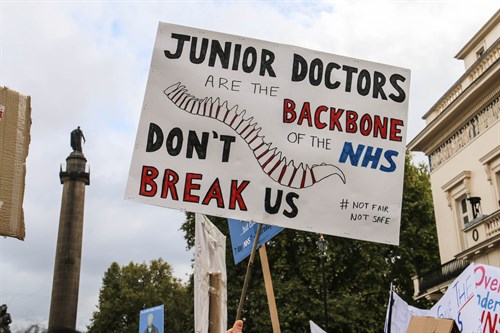
By Miriam Taegtmeyer,
This week junior doctors in Britain’s National Health Service (NHS) have announced a further series of strike action – an unprecedented action among a dedicated group of professionals. The NHS was established in the wake of World War II amid a broad consensus that health care should be made available to all and since then has provided care that is free at the point of delivery and based on need. At least so far. The irony is that while the rest of the world is debating and embracing universal health coverage (UHC), and has put it as target 3.8 of the Sustainable Development Goals, Britain is systematically dismantling its excellent NHS and leaving in its place a fragmented system where health care is a business and patients are a market. Efficiency is a key driver as funding decreases while expectations and patient numbers continue to increase. It is this that junior doctors are rallying against – their strike is first and foremost an action to save our NHS.
I had the privilege of providing consultant cover on our infectious disease wards –on the last day of strike action (Feb 10th 2016). As an academic with clinical commitments I have grown used to relying on the team of juniors to guide me patiently and cheerfully through the new protocols, requirements, NHS pressures and expectations, allowing me to focus on listening to people, examining them, diagnosing and looking things up. Things I have been doing since I was a junior doctor myself, that I find immensely rewarding and that I am prepared to go the extra mile for. Because I believe in the NHS and what it stands for.
As house officers we did long hours. Ridiculously long hours. We expected to, and I loved it. I loved it because I was learning to be a better doctor, because I got positive feedback from patients and families, because we supported each other. My motivations were intrinsic: I knew my patients; I was part of a team; my seniors invested in teaching and supporting me; I spent more time with patients than with paperwork; we provided continuity of care and we learned from it. It was nice to earn a salary but for me it wasn’t a huge driver. As I muddled through clumsily on strike day I couldn’t help thinking how these basic intrinsic motivations have been eroded systemically over time. Junior doctors now work shift patterns, hand over cases without being able to follow up the outcomes and spend close to 50% of the average working day on paperwork. No wonder that imposing a new contract which further erodes motivation is a step too far.
So what has all this got to do with REACHOUT and research on community health workers and UHC in low- and middle-income countries? Community health workers in Bangladesh, Indonesia, Malawi, Kenya, Ethiopia and Mozambique point to the intrinsic motivations which drive them such as the support they get from supervisors, the appreciation communities give them and the satisfaction of learning collaboratively as a respected member of a team. They are dedicated individuals working for UHC because they too believe in it and they deserve to be recognised, supported and paid for their work, just like our junior doctors. We cannot expect excellence in health care when we have a demoralised and demotivated workforce. As these new strikes are announced it seems to me that the UK’s Department of Health stands to learn a lot from REACHOUT as well as from its junior doctors at home, if the politicians and Jeremy Hunt can muster sufficient humility to listen.
Photo credit: Rohin Francis https://www.flickr.com/photos/rohinfrancis/22079392868
Recent news
- Working with what we’ve got – an(other) reflection on human resources for health
- Webinar: Community health workers - the gender agenda #HSGGENDER, 8 February 2016
- Panel on community health workers at the Prince Mahidol Award Conference, 7 January 2016

This project is funded by the European Union.
